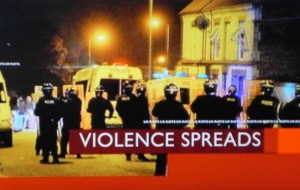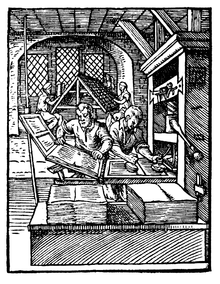 The riots that are currently spreading through UK cities are unprecedented. Mike Butcher, interviewed this morning on BBC Radio 4’s Today programme spoke of how mobile phones have become “weaponised”, and in an interesting turn of phrase he stated “thugs have found their Gutenberg press”. A Blackberry phone can send a message simultaneously to hundreds of other phones without leaving any trace.
The riots that are currently spreading through UK cities are unprecedented. Mike Butcher, interviewed this morning on BBC Radio 4’s Today programme spoke of how mobile phones have become “weaponised”, and in an interesting turn of phrase he stated “thugs have found their Gutenberg press”. A Blackberry phone can send a message simultaneously to hundreds of other phones without leaving any trace.
The mobile phone, central to the News International hacking scandal a few weeks ago, is now being held responsible for the violence of the current riots. The technology has developed so fast, and become so universal, that it’s taken the police and politicians unawares. It seems likely to be as impossible to control as the internet itself.
The parallel between the mobile phone and the Gutenberg press is not an obvious one.
Johannes Gutenberg’s printing press with moveable type was operating in Germany by around 1450 and his Bible was printed in 1455. It’s hard for us now to imagine how revolutionary the press was, but as with the mobile phone it made it possible to send identical messages to hundreds of people, and for it to be difficult to trace back to its source. So printing could be, and was, seen as subversive when it was first invented.
By Shakespeare’s time printing and publication in England had become regularised, with printers being controlled by the Stationers Company from 1557, and books having to be licensed before publication by 1586. In the theatre, plays had to be licensed before they could be performed, and some potentially inflammatory scenes which had been performed on stage were omitted from printed versions. Printing had become a tool of government propaganda.
You can see something of this attitude in Shakespeare’s scenes of rioting. The Jack Cade rebellion took place in 1450, and takes up much of Shakespeare’s infrequently-performed play Henry VI Part 2. The Duke of York, who plans to take the throne, incites Cade to lead a rebellion so he can “reap the harvest which that rascal sow’d”. Initially Cade can appear to be a likeable rogue, but the execution of the inoffensive Clerk of Chartham whose only crime is being able to read and write, marks him down as dangerous. The ignorant, uneducated mob are described by Cade as “honest plain-dealing” men whereas those who are literate represent the power of the state, education itself being an instrument of oppression. Before executing Lord Say, Cade lists his crimes:
Thou hast most traitorously corrupted the youth of the realm in erecting a grammar-school; and whereas, before, our forefathers had no other books but the score and the tally, thou has caused printing to be us’d.
This is incidentally an anachronism, as Cade’s rebellion took place before printing was established. In Julius Caesar, written around ten years later, Shakespeare uses the same idea. Cinna the Poet is guilty of nothing but sharing the name of one of the conspirators who killed Caesar, but is torn apart onstage by a mob who “tear him for his bad verses”.
In Coriolanus the mob riots because they are starving, but Shakesepeare’s never on the side of any crowd when they turn into a violent mob. As in London now, it doesn’t take long for Cade’s followers in Henry VI Part 2 to turn to destroying buildings and looting. A messenger brings news to the king:
Jack Cade hath almost gotten London Bridge;
The citizens fly and forsake their houses;
The rascal people, thirsting after prey,
Join with the traitor; and they jointly swear
To spoil the city and your royal court
It’ll be interesting to see whether those trying to re-establish control and prevent violence are able to use new technology to restore order.



‘It’ll be interesting to see whether those trying to re-establish control and prevent violence are able to use new technology to restore order.’
They already are: http://blogs.independent.co.uk/2011/08/10/the-anti-riot-movement-sweeping-the-nation/
This is genius, isn’t it? The cup of tea is a really good example of the power of the new media, but I love the gesture of holding a broom aloft. Quite by coincidence I went to Midsummer Night’s Dream on Weds and there was Puck doing the same thing!